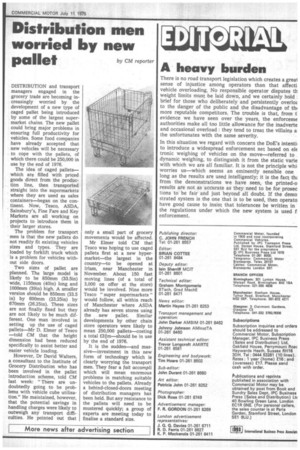A heavy burden
Page 7

If you've noticed an error in this article please click here to report it so we can fix it.
There is no road transport legislation which creates a greal sense of injustice among operators than that affecti vehicle overloading. No responsible operator disputes th weight limits must be laid down, and we certainly hold brief for those who deliberately and persistently overloe to the danger of the public and the disadvantage of till more reputable competitors. The trouble is that, from t evidence we have seen over the years, the enforceme authorities make all too little allowance for the inadverte and occasional overload : they tend to treat the villains a the unfortunates with the same severity.
In this situation we regard with concern the DoE's intentil to introduce a widespread enforcement net based on elE tronic weighing of vehicles on the move—referred to dynamic weighing, to distinguish it from the static vane with Which we are all familiar. It is not the principle whi, worries us—which seems an eminently sensible one long as the results are used intelligently; it is the fact thi from the demonstrations we have seen, the printed-o results are not as accurate as they need to be for prosec tions to be fair and just beyond all doubt. If the demo strated system is the one that is to be used, then operato have good cause to insist that tolerances be written in the regulations under which the new system is used f enforcement.












































































































































